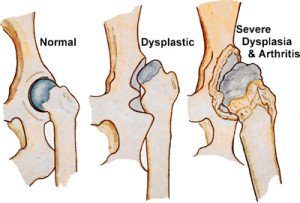Pain Relief for Hip Dysplasia or Arthritis

There are several ways to help relieve the pain of hip dysplasia or arthritis.
Weight control to either reduce weight or prevent the dog from becoming overweight will help to reduce the mechanical stresses applied to the joints.
Controlled exercise will help to prevent or relieve the inflammatory process that leads to the pain associated with arthritis. The amount and difficulty of the exercise will need to be tailored for each individual dog.
Non-weight bearing exercise such as swimming/hydrotherapy is helpful providing it is not contraindicated by other medical conditions.
Many arthritic dogs appreciate muscle massages, which stimulate the blood flow, increasing the circulation, the dog’s flexibility and sense of well-being.
Keeping the dog in a warm environment will help to control the pain of arthritis from hip dysplasia. Cold and damp conditions can aggravate arthritis. Warm compresses over sore joints can be soothing, but care must be taken to avoid injury from excess heat.
Acupuncture can help to make a dog more comfortable and mobile.
Laser (Class IV therapeutic lasers) stimulate blood flow to tissues and can greatly improve the arthritic condition.
Switching a dog to a raw diet has been shown to be effective in relieving hip dysplasia symptoms.
Supplements that can help with hip dysplasia and/or arthritis are:
Glucosamine and chondroitin – these are effective in repairing joint wear and tear.
MSM is effective in relieving pain and joint inflammation.
Omega-3 fatty acids help to relieve joint inflammation.
Colostrum has been used by holistic vets in treating problems with joints and connective tissue. Colostrum facilitates the body’s regenerative processes and is even more effective when combined with chondroitin and glucosamine.
Hyaluronic Acid decreases pain and improves mobility.
Colloidal silver helps to regenerate both tissue and bone, and recent studies have shown that colloidal gold is very effective in treating arthritic conditions – it eliminates pain, increases mobility and reduces swelling.
The following herbs have been found to be effective in treating hip dysplasia and/or arthritis:
Dandelion and Nettle aid in joint repair and in eliminating metabolic wastes from the body.
Alfalfa helps to relieve the pain and discomfort that results from arthritis.
Licorice and Yucca have anti-inflammatory properties.
Ginkgo, Hawthorne, Rosemary, Cayenne and Ginger improve blood circulation.
The environment at home should be supportive of the condition:
Well-padded, soft supportive bedding away from cold or damp drafts should be provided. This will also help to prevent the development of pressure-point calluses.
Using steps or ramps to get in and out of a car or up to a bed will help.
Non-skid flooring such as carpets or secure rugs will aid traction as the dog walks.
Pain medication (including nonsteroidal anti-inflammatory drugs, or NSAIDs) may help to relieve pain.
Surgery may be an option – this needs to be discussed with the dog’s vet.
